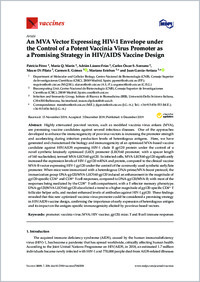An MVA vector expressing HIV-1 envelope under the control of a potent vaccinia virus promoter as a promising strategy in HIV/AIDS vaccine design
- Pérez, Patricia Department of Molecular and Cellular Biology, Centro Nacional de Biotecnología (CNB), Consejo Superior de Investigaciones Científicas (CSIC), 28049 Madrid, Spain
- Marín, María Q. Department of Molecular and Cellular Biology, Centro Nacional de Biotecnología (CNB), Consejo Superior de Investigaciones Científicas (CSIC), 28049 Madrid, Spain
- Lázaro-Frías, Adrián Department of Molecular and Cellular Biology, Centro Nacional de Biotecnología (CNB), Consejo Superior de Investigaciones Científicas (CSIC), 28049 Madrid, Spain
- Sorzano, Carlos Óscar S. Biocomputing Unit, Centro Nacional de Biotecnología (CNB), Consejo Superior de Investigaciones Científicas (CSIC), 28049 Madrid, Spain
- Di Pilato, Mauro Institute for Research in Biomedicine (IRB), Faculty of Biomedical Sciences, Università della Svizzera italiana, Switzerland
- Gómez, Carmen E. Department of Molecular and Cellular Biology, Centro Nacional de Biotecnología (CNB), Consejo Superior de Investigaciones Científicas (CSIC), 28049 Madrid, Spain
- Esteban, Mariano Department of Molecular and Cellular Biology, Centro Nacional de Biotecnología (CNB), Consejo Superior de Investigaciones Científicas (CSIC), 28049 Madrid, Spain
- García-Arriaza, Juan Department of Molecular and Cellular Biology, Centro Nacional de Biotecnología (CNB), Consejo Superior de Investigaciones Científicas (CSIC), 28049 Madrid, Spain
-
06.12.2019
Published in:
- Vaccines. - 2019, vol. 7, no. 4, p. 208
English
Highly attenuated poxviral vectors, such as modified vaccinia virus ankara (MVA), are promising vaccine candidates against several infectious diseases. One of the approaches developed to enhance the immunogenicity of poxvirus vectors is increasing the promoter strength and accelerating during infection production levels of heterologous antigens. Here, we have generated and characterized the biology and immunogenicity of an optimized MVA-based vaccine candidate against HIV/AIDS expressing HIV-1 clade B gp120 protein under the control of a novel synthetic late/early optimized (LEO) promoter (LEO160 promoter; with a spacer length of 160 nucleotides), termed MVA-LEO160-gp120. In infected cells, MVA-LEO160-gp120 significantly increased the expression levels of HIV-1 gp120 mRNA and protein, compared to the clinical vaccine MVA-B vector expressing HIV-1 gp120 under the control of the commonly used synthetic early/late promoter. When mice were immunized with a heterologous DNA-prime/MVA-boost protocol, the immunization group DNA- gp120/MVA-LEO160-gp120 induced an enhancement in the magnitude of gp120-specific CD4+ and CD8+ T-cell responses, compared to DNA-gp120/MVA-B; with most of the responses being mediated by the CD8+ T-cell compartment, with a T effector memory phenotype. DNA-gp120/MVA-LEO160-gp120 also elicited a trend to a higher magnitude of gp120-specific CD4+ T follicular helper cells, and modest enhanced levels of antibodies against HIV-1 gp120. These findings revealed that this new optimized vaccinia virus promoter could be considered a promising strategy in HIV/AIDS vaccine design, confirming the importance of early expression of heterologous antigen and its impact on the antigen-specific immunogenicity elicited by poxvirus-based vectors.
- Language
-
- English
- Classification
- Medicine
- License
- Open access status
- gold
- Identifiers
-
- RERO DOC 328281
- DOI 10.3390/vaccines7040208
- ARK ark:/12658/srd1319124
- Persistent URL
- https://n2t.net/ark:/12658/srd1319124
Statistics
Document views: 179
File downloads:
- Texte intégral: 209
